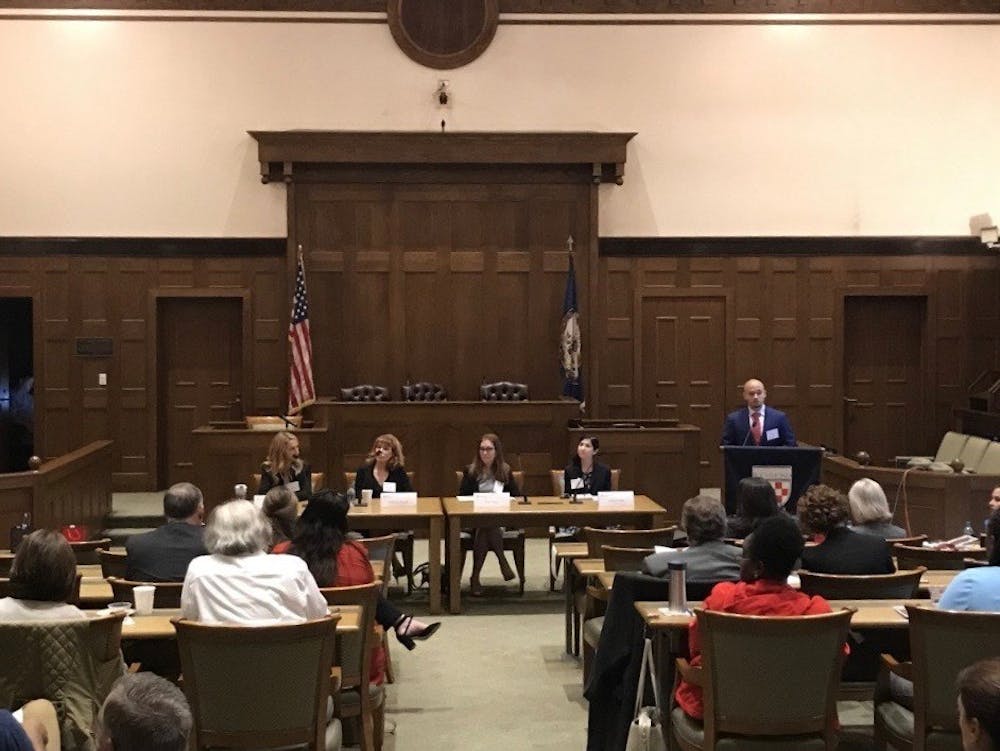The T.C. Williams School of Law held a symposium on Oct. 19 to continue the #MeToo discussion that has been occurring nationwide.
Just over one year ago, rape allegations against Harvey Weinstein initiated the #MeToo movement. Since then, the movement has gained momentum and has become a platform for people to share their personal stories about sexual assault.
The University of Richmond Public Interest Law Review organized the event for law professors, attorneys, lawyers, students and others working in the realm of legal settings to speak about issues regarding #MeToo.
Sharyn Tejani, the director of the TIME’S UP Legal Defense Fund, started the program by discussing problems with the Title VII Employment Law.
“Title VII is the civil rights law that prohibits discrimination on the basis of race, sex, national origin, orientation or religion,” Tejani said.
Although the implications of Title VII would supposedly provide equal protection in the workplace, it soon became evident that there were many flaws with this law, Tejani said.
"Some work industries are set up in a way that makes it dangerous to complain [about sexual harassment],” Tejani said.
Domestic workers often have their housing tied to their work, and restaurant workers rely on tips for their living, Tejani said. Additionally, these workers are often members of low-wage and minority groups who cannot afford to lose their jobs. Therefore, these people have generally been less likely to report sexual harassment, Tejani said.
Since the start of #MeToo, however, victims who are members of low-wage and minority groups have found an outlet to address their sexual harassment, said Janice Craft, an attorney with the Virginia Sexual and Domestic Violence Action Alliance.
"Previously, it was wealthy, white women in the entertainment industry speaking out, but I think we are seeing as the outgrowth of this [#MeToo Movement], women of color and those who work in the service, agricultural and restaurant industry are getting expanded recognition of their sexual harassment and violence, too,” Craft said.
It is the recognition and open discussion of these challenging issues that has made #MeToo such an important platform in the 21st century, said Lesley Wexler, a professor of law at Illinois College of Law. Wexler discussed how these sexual harassment cases go beyond the legal setting.
“For me, Me Too is a perfect example of both a law and non-law question,” Wexler said.
Enjoy what you're reading?
Signup for our newsletter
Although this movement is guided by Title VII and the Constitution, it is, on the most fundamental level, a movement of discussion, listening and understanding, Wexler said.
“Enter these dialogues with an open-mind," Wexler said. "Be willing to be believe alleged victims. To believe all women doesn’t imply a devaluation of others. It is simply a demand for equity.”
Although each speaker and panelist brought different knowledge and perspectives to the symposium, the program carried a common theme: the importance of having an ongoing discussion about workplace sexual harassment and violence.
The speakers, in the order of the program, were as follows: MaryAnn Grover, law school dean Wendy Perdue, Sharyn Tejani, Lesley Wexler, Megan Zwisohn, Jennifer Robbennolt, Patty Gill, Rebecca Royals, Kati Dean, Janice Craft and Kevin Woodson.
Contact news writer Emily Mendelson at emily.mendelson@richmond.edu.
Support independent student media
You can make a tax-deductible donation by clicking the button below, which takes you to our secure PayPal account. The page is set up to receive contributions in whatever amount you designate. We look forward to using the money we raise to further our mission of providing honest and accurate information to students, faculty, staff, alumni and others in the general public.
Donate Now



